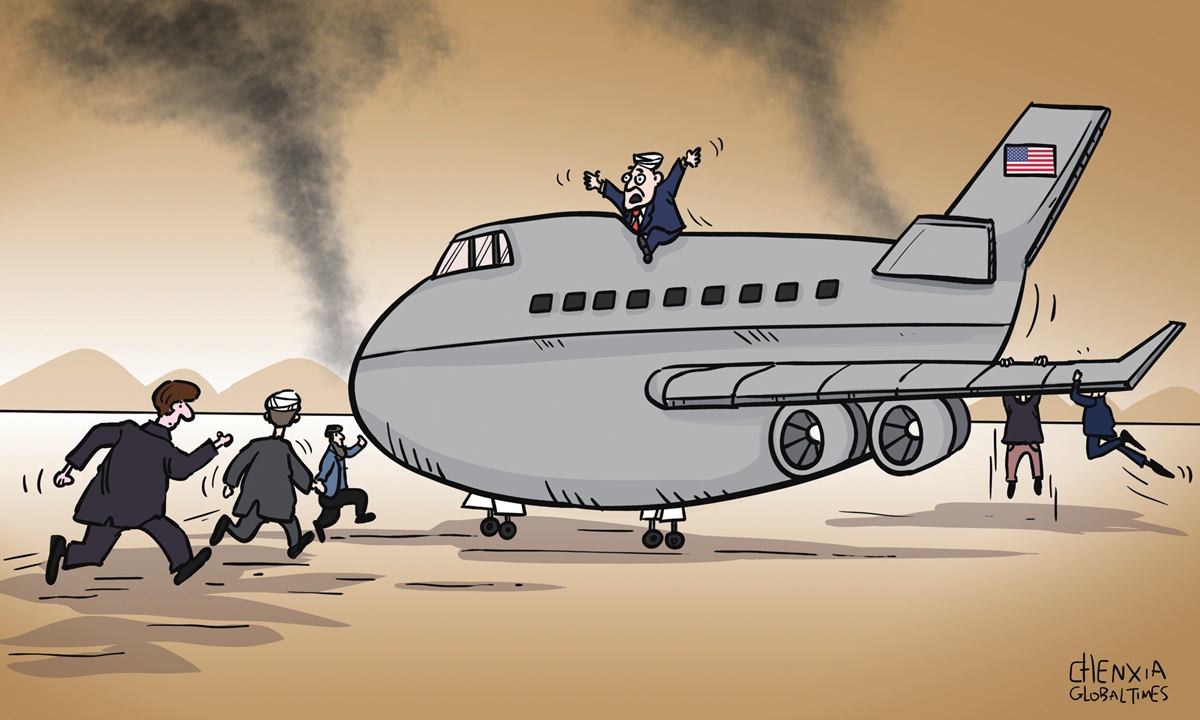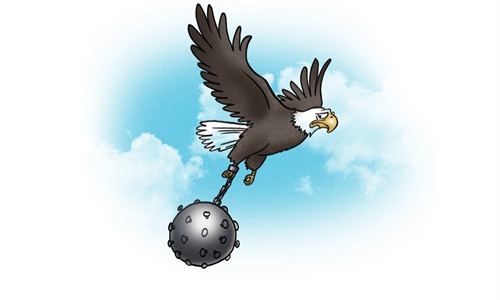
Illustration: Chen Xia/GT
US troops' hasty withdrawal from Afghanistan and the mayhem in Kabul continue to shock the international community. For two decades, the US has spent about $2.3 trillion and lost more than 2,400 soldiers in Afghanistan, for nothing.Debacle in Afghanistan is another proof of the failure of US' military and diplomatic adventure that it once proudly called "position of strength."
Looking back over 200 years since the founding of the US, we can find that Americans have always had contradictory understanding of diplomacy.
From the first president George Washington's "isolationism" to Woodrow Wilson's "Fourteen Points," from the Declaration of Independence and the US Constitution to Abraham Lincoln's concept of "government of the people, by the people, for the people," many of the US' leading politicians had warned against getting involved in the struggle for power.
But after World War II, the US began to dream of dominating the world. Since then, the American view of diplomacy has changed from emphasizing on values to prioritizing interests and power.
There have been two prongs of logic in American diplomacy. One is the approach called "position of strength" which is rooted in the deep hearts of American elite. The other is value-based diplomacy that Washington keeps talking about. For the Americans, when your strength cannot compare with theirs, they will stress the values. When your strength is approaching or even threatening theirs, they will explicitly use strength to contain and suppress you.
Obviously, pragmatism is the real principle guiding American diplomatic practice. The most effective way to deal with the pragmatic diplomacy of the US is to fight bravely and skillfully. Once the mask of the "paper tiger" is exposed, the US will show its weak side - strong outside but weak in the center, which will collapse at the first blow.
Why did the US' power-oriented diplomacy go bankrupt? Some policymaking elite in Washington still cannot figure out the answer. The US has threatened to "speak to China from a position of strength." But at the end of the day, it is just a "paper tiger" trying to bluff. In the logic of its diplomacy based on strength, the US will speak to others "from a position of strength" only when it realizes that it is in a weaker position.
China has already found an independent and successful path without blindly believing in what the US government preaches.
It is quite clear which country - China or the US - has the better system and stronger leadership - especially through the lens of different responses to the COVID-19 pandemic. The US is clearly finding it difficult to accept such a reality.
Apart from engaging China "from a position of strength," the current US administration has admitted that Washington's approach to Beijing will be "competitive when it should be, collaborative when it can be, and adversarial when it must be."
The Americans still do not understand that these words do not work well with the Chinese people anymore. It is not the Chinese but the Americans should make a choice now. The tumult in Afghanistan is a multiple-choice question the US has left for itself - the world is waiting to see how it will answer "from a position of strength."
So far, Washington has not yet figured out why it lost in Afghanistan after a 20-year-long war. The reason was simple: It holds a wrong understanding of strength.
Meanwhile, it is not difficult to see from the drastic change in Afghanistan that the US' strategic thinking on the great power competition is still stuck in the Cold War era. It is wrong of Washington to believe that material strength is the core of the great power competition.
The world today is undergoing a series of profound changes unseen in a century. Now, owning the hearts and supports of the people is the greatest strength instead of being "armed to the teeth." Washington is clearly on the wrong path. And it is not qualified to speak to the world "from a position of strength." What happened in Afghanistan is just another example of how Washington's acts of hegemony on the international stage continue to lead to serious consequences.
The author is professor at the Institute of International Studies of Tsinghua University. opinion@globaltimes.com.cn


